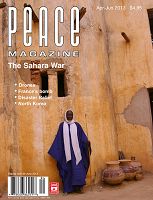
Peace Magazine Apr-Jun 2013, page 2. Some rights reserved.
Search for other articles by peacemag here
The 45-member UN Commission on the Status of Women met last year without being able to produce an outcome document because some conservative governments refused to endorse women’s reproductive rights, which they equated to the right to abortion.
This year some member states wanted to delete from the outcome document any mention of Security Council resolutions 1325 and 1820; Russia and an African group question the linkage between gender equality, peace, security, and development. In the end, however, the Commission did adopt a document condemning violence against women and girls. It also urges protection of the right to sexual and reproductive health; governments are thus affirming their commitment to take concrete actions to that end. It was then announced that Michelle Bachelet is stepping down as executive director of UN Women, the agency mandated to promote gender equality. She will return to live in her native land, Chile.
Sources: Thalif Deen, Inter Press Service; Ingeborg Brienes.
Two important meetings took place consecutively in Oslo, Norway early in March. Governments, international organizations and civil society came together at the invitation of the Norwegian government to discuss together the effects of the use of nuclear weapons on human health, the environment, economies, and development.
Only two of the states owning nuclear weapons came: India and Pakistan. The other nuclear weapon states—China, North Korea, France, Israel, Russia, UK, and the US—boycotted the meeting. Their absence did not stop the other countries and organizations from moving ahead. Mexico decided to host a follow-up meeting—an offer that the civil society representatives in the room appreciated warmly, recognizing it as a significant step toward negotiating a treaty banning nuclear weapons. Just before the international meeting hosted by the government of Norway, there was another two-day meeting convened by the International Campaign to Abolish Nuclear Weapons (ICAN). This Civil Society Forum brought together another 400 activists from 70 countries. A full report from that meeting will be available at www.icanw.org.
Source: Beatrice Fihn and Ray Acheson of Reaching Critical Will. Details are available at: www.reachingcriticalwill.org.
In the US, 14 agencies of the National Science and Technology Council announced in February a five-year plan to study environmental changes in the Arctic. Data from the Alaska governor’s office, indigenous Arctic communities, local organizations, and universities will be analyzed. The rapidly melting ice is raising sea levels and changing the composition and distribution of species. As a result, northern communities that depend on those resources for food are changing their harvest practices and/or their diets.
Arctic indigenous people have shorter life expectancies, higher infant mortality, and more prevalent infections. The scientific research will seek greater understanding of these problems and their connection to the changing environment so as to help Arctic residents adapt. The researchers working in the Arctic for the Canadian government, on the other hand, are falling behind their peers in other countries. Basic science is being neglected in places such as Eureka, Nunavut, where the highest-latitude civilian research station is located. Funds have been cut for that station, the Polar Environment Atmospheric Research Lab (PEARL), which is a key site for measuring greenhouse gas levels in the Earth’s atmosphere. The PEARL researchers say that their measurements there dropped last year from 150 to around 30 because of this funding shortfall. On the other hand, the Canadian government signed a $288-million contract to build new Arctic patrol ships. The researchers say they are embarrassed at international conferences because the maps they present have big gaps over Canada. The Swedes and Germans have to do their work for them, while pointedly asking, “Why are you not getting support to do this? You’re doing good science.” PEARL’s diminished funding reflects a pattern of cutbacks that has been called a deliberate “muzzling” of Canadian government scientists. Federal Information Commissioner Suzanne Legault has been asked to investigate such systemic obstruction of research.
When journalists approach climate change scientists in the United States to ask questions, they normally receive immediate replies, with offers to talk in person or on the phone. But in Canada such questions now have to go through public relations officials, sometimes taking days and even limiting what the interview can discuss. Canada’s reputation is being tarnished.
Sources: Brendan P. Kelly, Simon Stephenson (National Science Foundation) and Kate Allen: Science, Technology World.

Peace Magazine Apr-Jun 2013, page 2. Some rights reserved.
Search for other articles by peacemag here